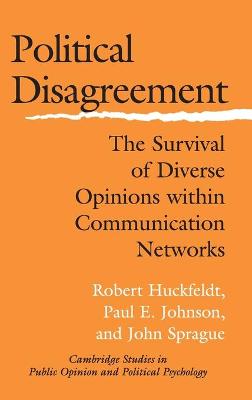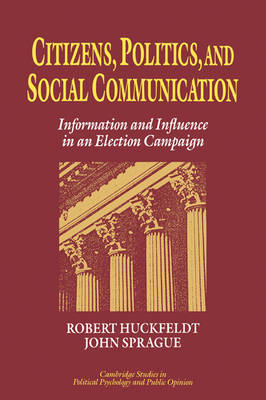Cambridge Studies in Public Opinion and Political Psychology
3 total works
Political Disagreement
by Robert Huckfeldt, Paul E. Johnson, and John Sprague
Published 1 January 2004
Political disagreement is widespread within the communication network of ordinary citizens; furthermore, political diversity within these networks is entirely consistent with a theory of democratic politics built on the importance of individual interdependence. The persistence of political diversity and disagreement does not imply that political interdependence is absent among citizens or that political influence is lacking. The book's analysis makes a number of contributions. The authors demonstrate the ubiquitous nature of political disagreement. They show that communication and influence within dyads is autoregressive - that the consequences of dyadic interactions depend on the distribution of opinions within larger networks of communication. They argue that the autoregressive nature of political influence serves to sustain disagreement within patterns of social interaction, as it restores the broader political relevance of social communication and influence. They eliminate the deterministic implications that have typically been connected to theories of democratic politics based on interdependent citizens.
Citizens, Politics and Social Communication
by R Robert Huckfeldt and John Sprague
Published 27 January 1995
Democratic politics is a collective enterprise, not simply because individual votes are counted to determine winners, but more fundamentally because the individual exercise of citizenship is an interdependent undertaking. Citizens argue with one another and they generally arrive at political decisions through processes of social interaction and deliberation. This book is dedicated to investigating the political implications of interdependent citizens within the context of the 1984 presidential campaign as it was experienced in the metropolitan area of South Bend, Indiana. Hence this is a community study in the fullest sense of the term. National politics is experienced locally through a series of filters unique to a particular setting and its consequences for the exercise of democratic citizenship.
Experts, Activists, and Democratic Politics
by T K Ahn, Robert Huckfeldt, and John Barry Ryan
Published 5 November 2014
This book addresses opinion leadership in democratic politics as a process whereby individuals send and receive information through their informally based networks of political communication. The analyses are based on a series of small group experiments, conducted by the authors, which build on accumulated evidence from more than seventy years of survey data regarding political communication among interdependent actors. The various experimental designs provide an opportunity to assess the nature of the communication process, both in terms of increasing citizen expertise as well as in terms of communicating political biases.


